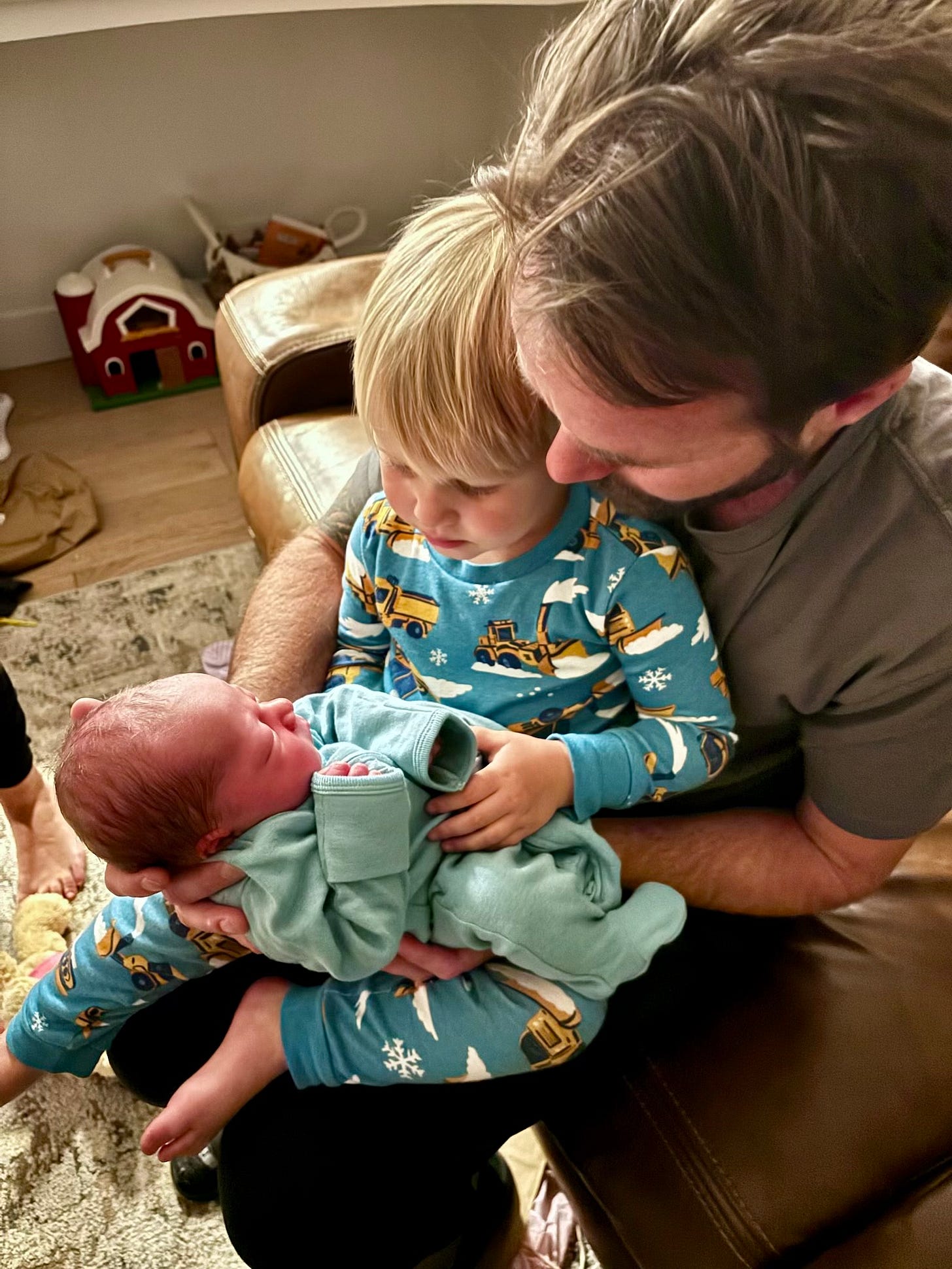“I’ve Had Enough!”
So communicated a two-year-old and a 24-hour-old, moments apart, the first of many times they will say that in their lives.
Two days ago, I witnessed my two-year-old grandson meet his 24-hour-old brother. It was the cutest thing!
For months, Finn, the two-year-old, had been told he had a brother coming. Nonplussed was he. He couldn’t relate. After all, he was only two.
The night of the big reveal was no different. As much as we tried to build up the looming introduction—a meeting that would change his life forever—he just ran around the house as if he was the center of the universe. Did I mention … he was two?
Then Dad appeared. He greeted Finn and told him his brother was there.
Finn kept running around with his toy.
Then mom appeared. She stood in the open front door, bundle in hand.
Finn’s toy clanked on the ground. He hid behind a cupboard, peering at mom.
“Wanna see Theo?” she asked.
Finn stepped out, staring up at mom.
Mom squatted down and Finn studied the red-faced, puffy-eyed boy. Wide-eyed. Uncertain. But fascinated.
“That’s who was in mommy’s tummy,” she said.
Now it was real. Now he could touch him. And he did.
A minute later he sat on dad’s lap so they could hold him together. He touched his brother’s face. He kissed him. He let the tiny fingers wrap around his. Then dad unzipped the onesie, exposing the most tender, smooth skin, wrapped around a just-forming chest. Finn caressed it.
But for Theo, that was enough. All the kissing and touching and attention was too much. He let out a new-vocal-cords shrill, a shriek that felt like it ripped the air, one that tugs at the heart. It was a cry that clearly said: “I’ve had enough.”
Five seconds later, Finn felt it, too. He thought he’d done something wrong and hurt his new brother. His face contorted, his eyes filled up, his skin turned red, and he let out a cry that said, “I’ve had enough, too.” It had all been too much, too much revelation, too much he couldn’t understand.
Dad and mom comforted him, told him he did nothing wrong, but he was not to be consoled. He had reached his two-year-old limit.
Watching Finn and Theo made me realize—overwhelm doesn’t disappear with age. We don’t outgrow it. We just learn high-pitched wails work only so long. Here are a few things that are working for me.
Journaling is tops for me. There is no close second. Writing out my thoughts and feelings—even though at times it feels tedious and self-indulgent—quantifies them like nothing else. Then I know what I am dealing with. Is it just a fickle feeling? Or is it more? Over the last couple years, for intractable problems, I will go over and over a journal entry, sometimes for days or weeks, refining it and crystalizing it, until I fully understand the source of my overwhelm. (And accurate understanding leads to solving it, for me, 100% of the time).
Half-awake rumination is shockingly effective. Some of my best ideas come in this semi-conscious state, usually around 4:30 a.m. I’m not dreaming, not fully alert—but fully me. And often, my best problem-solving me. I used to either try to fall back asleep or just get up when I was in this state. But no more. (As long as it’s after four a.m.)
I walk. Or hike. I find that movement does something to my brain, it activates a different hemisphere, it rotates problems on their axis so I can see different facets.
Maybe you don’t have moments of overwhelm. Maybe just the Guidroz men named Ken, Finn and Theo do. If so, God bless you.
For everyone else, well—you’ll have to figure it out yourself. Find your tricks. Your hacks. Find out what can move you from despair to hope. And if I’m still sending out these essays when they are grown, I’ll let you know what they figured out.





